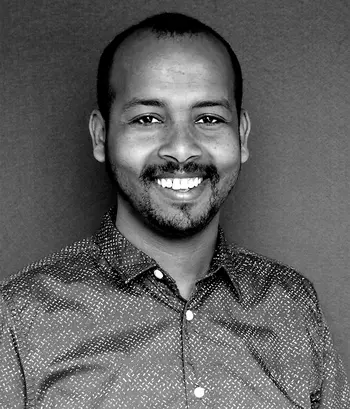GRADUATION TALK ▼
ENDURANCE AND RESILIENCE
AN INTERVIEW WITH DANIEL SEWASEW

:::::::::::::::::::::::::::::::::::::::::::::::::::::::::::::::::::::::::::::::::::::::::::::::::::::
SHORT PROFILE
Name: Daniel Sewasew
Field: Psychology
Location: Ethiopia
+ Daniel's Alumnus Profile
:::::::::::::::::::::::::::::::::::::::::::::::::::::::::::::::::::::::::::::::::::::::::::::::::::::
▐ Daniel Sewasew tells us about the fascination with his dissertation topic, how he handled rough research traditions and what his next career steps will be.
//What drew you to your dissertation topic and what interests you most about it?
D.S. Back in my bachelor and master studies, I thoroughly enjoyed early childhood education and care courses. I was particularly fascinated by age-specific measures to support children. In my work experience, I came to realize that students’ academic success is highly relying on their perception of their own academic ability (i.e., beyond their actual performance). Fortunately, the BAGSS scholarship allowed me to build on this interest from my early academic career, and jointly investigate students’ academic competence and academic self-concept longitudinally.
//What was an important lesson you learned in the process of your research and writing your dissertation?
D.S. Doctoral study is a tough academic career path that candidates can only handle when they are resilient enough through the whole process. Endurance and tenacity were the key elements to breakthrough when I got stuck and helped me keep moving to manage my research project. I have learned that students should not only be prepared for conducting a study but also facing the rough research traditions: publication, convincing peer reviewers, above all waiting patiently.
// Can you give us a small sneak peek about the findings of your thesis?
D.S. Most captivatingly, I found positive developmental relations between achievement and self-concept within a domain and negative relations across two non-matching domains (maths and English) in primary school-age children. This is a novel finding for this age group. Moreover, I found motivational constructs (i.e., academic self-concept) to be equally relevant as academic achievement for students’ school career and future life successes. Also, I found that these effects are potentially moderated by a range of socio-demographic factors (e.g., ethnic/migration-background, sex, socio-economic status).
// What is the next step in your career?
D.S. I will move back to my home country (Ethiopia) and definitely will stay in academia. Particularly, I have the ambition to work on projects that aim to enhance STEM subjects and reading abilities in pre-school and primary school children.
........................................................................................................................................................
MAIN PAGE | CONTACT | LEGAL | PRIVACY POLICY | DATENSCHUTZ | IMPRESSUM
© Bamberg Graduate School of Social Sciences
Image Credits: © Bamberg Graduate School of Social Sciences